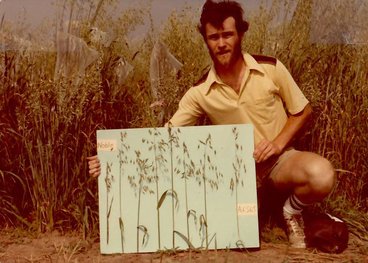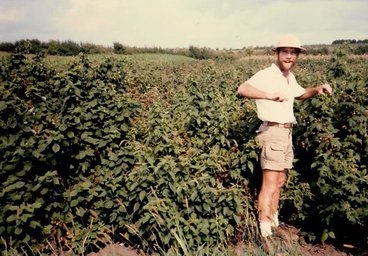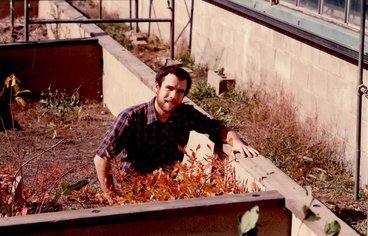In commemorating his 41 years of unwavering dedication to academia, we pause to reflect on the distinguished career of Professor Jim Luby. During his tenure, Professor Luby has become a leader in the plant breeding community at the University of Minnesota and beyond, excelling in cultivar development, plant breeding research, and instruction and advising of students. As the curtain closes on his time in the Department of Horticultural Science, Professor Luby reflects on the journey that led him through the world of academia, nurturing not only plants but also the minds of countless students who moved through his classroom and research programs.

Luby’s journey began with a deep-rooted passion for biology and nature, fostered by his mother’s influence. "My interest in biology and nature started with my mom who was a nature guide at the Madison School Forest in the University of Wisconsin Arboretum" Luby reminisces fondly, "I spent a lot of time going on outings with her.” This early fascination blossomed into a lifelong dedication to understanding the intricacies of the natural world and, along with an introduction to agriculture gained by working on his uncle’s dairy farm, ultimately guided him toward a career in plant breeding.
"When I graduated and was thinking about what I wanted my career to look like, this is largely what I expected, working with students and conducting research," Luby recollects, thinking back to the earlier days of his academic career. "However, I didn’t expect to spend as much time on grapes. That breeding program developed as we had funding and really helped put cold-hardy grapes on the map. That research gradually evolved into more time on apples as we got more funding and had more genomic tools available, which has led to some great apple variety releases as well.” Since 1982, Luby has led the Department of Horticultural Science’s fruit breeding and genetics program that has been responsible for developing 31 cultivars of apple, grape, blueberry, strawberry, raspberry, pear, and plum. Several notable apple releases include household favorites: Honeycrisp, Zestar!®, SweeTango®, and First Kiss®.

Over the decades, Luby has witnessed firsthand the remarkable strides taken in the realm of technology, revolutionizing the field of plant breeding. "The technological advances are certainly notable when I think about the significant changes I’ve witnessed," he reflects, marveling at the rapid evolution of the genomic tools that are more affordable and accessible today. “The genomics principles we were learning about in the 70s as a graduate student had been figured out in a theoretical and conceptual way, but we didn’t have the tools to do it in our labs. When genomics tools became widely available in the early 2000s, the abilities of our plant breeding programs greatly increased.” The technological advances seen throughout Luby’s career certainly have not been limited to genomic tools. Luby reflects on the progression of basic computational power and advancements seen on campus over the years. "The cell phone I have in my pocket today has more computing power than the whole basement of Coffey Hall which was dedicated to the new IBM computer in the 70s!"
Throughout his tenure, Luby has remained committed to innovative teaching methods, advocating for experiential learning as a cornerstone of education. "Students love to get their hands dirty and get involved, so trying to incorporate some aspect of experiential learning into a course is something I’ve tried to prioritize," he explains. "This method of teaching has been successful for people with a variety of different learning preferences because it incorporates visual learning, auditory learning, and social learning styles." Throughout his years in the department, Luby has significantly influenced the lives of his students. He has advised 14 PhD students, 12 M.S. students, supervised 6 postdocs, and served on over 170 graduate committees. Additionally, he spent 17 years as the graduate program director or associate director for the graduate programs in Horticulture and Applied Plant Sciences.
As he imparts wisdom to budding scholars, Luby underscores the importance of honing one's writing skills, a skill he believes to be of paramount importance in the scientific realm. "The advice that I give to graduate students is to become the best writer you can be," he advises. “Writing is the craft that we as scientists use the most to convey our work and its importance. From writing popular pieces that explain science to the public, to professional technical writing, and even writing emails, so much of your professional success will come from your writing ability." However, amid the hard work of academia, Luby is mindful of the inherent joy in his work. "I also think having fun with plants is important and being a bit of a geek!" he chuckles, a testament to his enduring enthusiasm for his field.
Reflecting on his collaborations and achievements, Luby remains extremely humble. "Getting to follow students as they develop into their profession has been very rewarding," he shares. “It’s ironic that so many people who were my students as either undergraduate or graduate students are now my colleagues here: Dr. Matt Clark, Dr. Soon Li Teh, Dr. Eric Watkins, Dr. Mary Rogers, Dr. Aaron Lorenz, and Dr. Seth Wannemuehler. Others have gone on to wonderful careers elsewhere. To think that I may have impacted that many people who will go on to impact more students is very fulfilling,” he shares. "And I’m also very proud of the fruit varieties that we’ve put out."

As he bids farewell to the department, Luby acknowledges the bittersweet nature of retirement. "I’m really going to miss the people the most. It’s been very energizing working in a place where I get to interact with people at all different ages and stages of life," he confesses. "But I’m looking forward to spending more time with my family, visiting our children, and our grandchild. I’m also planning to spend time volunteering with local organizations and am looking forward to traveling and spending more time outdoors exercising and pursuing hobbies."
After decades spent amidst orchards and fields, what is his favorite fruit? Luby muses, "My favorite fruit has been whatever I’m not in the middle of tasting! Strawberry season comes first, and you really look forward to it, but after you’re tasting strawberries for a few weeks, you get pretty sick of them. And then you look forward to blueberries and after a few weeks, you’re dreaming of apples." As one chapter closes and another begins, Professor Jim Luby leaves behind a legacy woven with passion, dedication, and an unwavering love for both knowledge and nature. Cheers to Professor Luby for a retirement richly deserved and a lifetime of invaluable contributions to academia and beyond!
